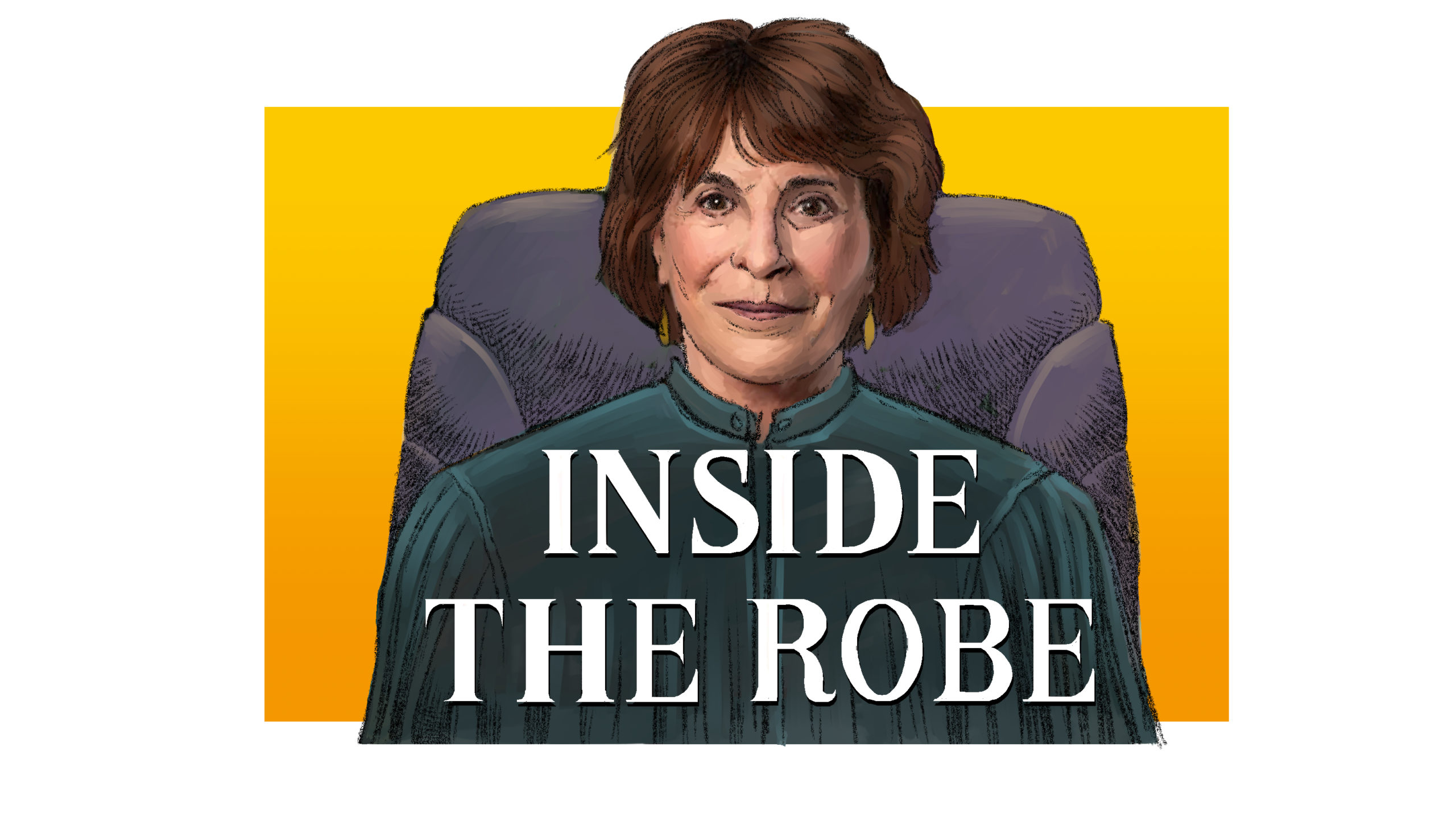Katherine Mader spent two decades as a judge in Los Angeles Criminal Court, before retiring early in 2020. Before that she was the LAPD’s first Inspector General, prosecuted two murder-for-hire trials and served as a defense attorney who convinced a jury to spare the life of the Hillside Strangler. In August of this year, Judge Mader published Inside the Robe: A Judge’s Candid Tale of Criminal Justice in America, which best selling author Michael Connelly called: “a perfect book: engrossing and telling at the same time.” The Judge has granted Crime Story permission to excerpt the entirety of her book over the coming months. You can find previous installments of Inside the Robe here. This is Part 42.
April 5
My courtroom door swung open and a young female prosecutor, with whom I’ve been friendly, entered, whispered something to Cora, and hurriedly left the courtroom. The prosecutor did not meet my eyes. Something was up. When my clerk checked the court’s computer, he saw that the prosecutor disqualified me on a serious domestic violence case that was sent to me for trial. My skin shouldn’t bruise every time I am disqualified, but it still smarts. I have always wanted to be liked by everyone, to my detriment. Even Mother Teresa had detractors.
When I practiced law, if I disqualified a judge I liked, I would usually visit them, and explain why I did it. It alleviates the sting for the judge and made me feel that I didn’t burn my bridges. Nowadays, disqualifications fly around the courthouse, and no one comes by to apologize or explain. Is it a symbol of a lessening of civility in society? Of course, a judge can never ask the attorney why she filed the disqualification. That would again indicate embroilment and subject the judge to discipline by the CJP.
April 6
A night of restless sleep. Agitating my brain in the early morning was the disqualification filed by the female prosecutor with whom I thought I got along well. No matter how much I try to ignore being disqualified, my subconscious is difficult to fool. I wrestle with what my friend, a public defender, told me when I first became a judge: “If you are nice but not smart, attorneys will go to you. If you are not nice but smart, attorneys will still go to you. But if you are not nice and not smart, attorneys will not go to you.”
Keeping my friend’s advice close to my heart, I’ve tried to be smart enough and nice enough for both sides to go to me. For the most part, I’ve succeeded. There’s no possibility I ever was not nice or not smart enough for the prosecutor who disqualified me yesterday. Perhaps this was her supervisor’s idea.
Is blaming her supervisor a deflection from my own deficiencies? I don’t know how I appear to others on the bench. I think I know my colleagues well because we share meals together in the lunchroom or get together socially. Then I read about a colleague being disciplined for rude behavior and can’t believe it’s the person I know. I’ve never heard a word of warning from my staff, but that is normal staff behavior, even if I have asked them to pass along any criticism. Am I outside the mainstream? Or am I the victim of a personal grudge?
April 7
Mid-morning, our phone rang, and the court coordinator, Linda, was on the line. “Don’t think this is a ‘punishment,’” she said, “but we’re being jammed by the City Attorney’s Office, and we need to use a felony judge to try a misdemeanor.” It is unusual for a felony court to try misdemeanors, but it happens.
Misdemeanors are less serious than felonies and punishable by county jail, not state prison, and are prosecuted by deputy city attorneys. Deputy city attorney prosecutors, after spending several years in the office, learn that there’s little room to advance. They have to join the District Attorney’s Office, a county agency, to graduate to felonies, which is not easy. It must be frustrating for a deputy city attorney to imagine twenty years prosecuting driving under the influence, less serious domestic violence, and prostitution cases. Some deputy city attorneys feel comfortable staying in the office for their entire careers and never get jaded. Others either decamp for another office or stay but become disillusioned and bitter. Their disgruntlement can become amplified when other judges “dis” their cases as being “only” misdemeanors. Judges often undercut the offer of a deputy city attorney to settle a misdemeanor case. The newest judges are assigned to misdemeanors where they can make mistakes and do the least damage. That’s one more reason that deputy city attorneys are often irritable.
The misdemeanor trial involved a bearded, middle-aged Orthodox Jew wearing a skullcap, who was a licensed gun dealer. He had operated his gun store in a residential area of Los Angeles for twenty years, but now the area was undergoing gentrification. The neighbors wanted the gun dealer to leave the neighborhood. His attorney, a younger, slim Orthodox Jew, also with a skullcap, was incensed. “My client is being hounded by the City Attorney’s Office for a crime of selling two guns to someone he believed was authorized to buy them. The buyer was wearing an outfit that looked like that of a law enforcement officer. It turns out she wasn’t authorized to buy a gun. This should have been handled administratively through the agency that controls guns. He should have gotten a citation. This is a political prosecution. The elected City Attorney promised the neighborhood he would try to get rid of the gun dealer. The City Attorney announced the arrest of the gun dealer at a press conference. My client has seven children and no criminal record.”
I wondered about the politics of the case. None of the back story, if true, would come out during the trial because it was not relevant. Sometimes attorneys try to sway (or poison) the judge with irrelevant facts before a trial starts. I need to make sure that I have no bias either way as the trial progresses. But it is unusual for the elected City Attorney to personally announce a misdemeanor arrest at a press conference.
The prosecutor, a mild-mannered young female, had a strong position: “This defendant was extremely careless. He sold two guns to someone not authorized to buy them. The person who bought the guns gave one to a friend who used the gun in a murder! We have to take these types of mistakes seriously. Look at the consequences.”
Before the trial started, I tried to settle the case. The prosecutor, along with two levels of supervisors as well as the defense attorney, sat in my chambers around a round wooden table. Just before lunch, we agreed that a reasonable way to settle this case would be to allow the defendant to defer the resolution of the case for one year during which he would attend re-training and do some community service. If he completed these conditions, the case would be dismissed without the dealer having to enter a plea of guilty. Nothing would go on his record. This was important to the defendant because he wanted to keep his business afloat. The gun dealer refused to plead guilty to anything.
After lunch, I learned that neither of the two supervisors in my chambers had the authority to settle the case. They explained, “The head of the criminal division and the elected City Attorney need to sign off on this agreement.” This smelled like politics, just as the defense attorney suggested. The prosecutors asked, “Can we have until tomorrow morning to find out whether this deal will be okay with our bosses?”
I went to my supervising judge. “Can I just trail this case until tomorrow and not begin selecting a jury this afternoon? I might be able to settle it in the morning.” My supervising judge was miffed. “Why didn’t the city attorneys consider this settlement idea before they ‘jammed’ the court with all of their trials this morning? You should just start selecting the jury.”






